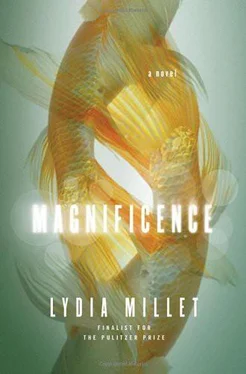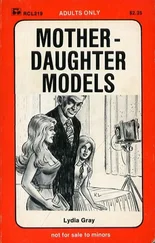She called a real estate agent and put the house up for sale. Casey issued a grudging invitation to stay at her apartment but Susan was afraid of grating on her. Meanwhile T. was forcing her to stay home from work for a while. She was ambivalent about this: the office was somewhere to go, a location in which to exist. But he insisted she take a leave of absence, and she had no strength left to argue.
She established a simple pattern of avoiding the spaces where she and Hal had spent most of their time, moving out of the master bedroom into a smaller room that had once been Casey’s.
But even trying to sleep in that room — a room she’d thought might be safe because it held almost no specific memory of Hal — she was preyed upon as soon as she lay motionless. Apprehension crept over her, a fringe of blackness she could almost see rising slowly from the foot of the bed, covering her feet, her legs, her chest, her shoulders, coming to smother her chin and her mouth like earth. Hal’s death and her own were gathered wretchedly in the shadows, hunched down with teeth showing, sharp teeth and the talons of bony fingers. A heaviness made her heart beat hard with fear — a leaden certainty that her selfishness had killed him. There was no buoyancy at all, no river to drift on.
She shifted onto the living room couch for several nights and during the daytime moved the bedroom’s furniture around, trying to find a configuration that would ease the weight. If it were different enough, she thought, it wouldn’t cause pain like this, so she removed the shades from the windows and hastily painted the walls an eggshell blue. She made forays to housewares stores and returned with items that spoke to her of freshness — blue and white linens, cushions, a screen, a wall hanging, a cloudy glass vase full of pussy willows. She wanted it to feel like a replacement room, a surprise. But the change was so slight, after all that, as to be unnoticeable.
So she considered, every night after twilight, whether to go to a hotel. She thought of lobbies, their carpeting and warm lights and the people milling. But in the end she did not go to a hotel. In the end she stayed home. She went out for as long as she could, to bars or the promenade or the Santa Monica Pier, sitting and smoking and drinking and idly watching the movement of crowds. But then she came home to sleep, or to lie there trying. Maybe it was apathy or maybe it was penance. She couldn’t decide.
Daytime was better. She went out with first light and walked T.’s dog around the neighborhood; she got coffee in the morning and took her lunches in restaurants or diners. Sometimes she drove around in a daze. Other times she asked friends over, made sure there were people in the house to lift its grimness. When she had to be there by herself she kept to the sunporch and Casey’s room, venturing into the kitchen only when she had to. The two of them had spent years in the kitchen.
His car was still in the shop, having bodywork done after a fender bender, so she asked the man there to sell it for her. He said no at first, but when she told him why he relented and said yes. Then she began looking for a new place to live. It took her out of the house, it distracted her, it pushed her forward. . she thought maybe a small one-room condo near the beach. That was the benefit of being alone: she needed little square footage, could buy for location, could afford, possibly, a clear view of the ocean. She tried to picture a new life and when she did so — putting it neatly into a frame as though the future was visible through a porthole — she saw the blue ocean.
She visited Casey as often as she could, sought her out for meals or trips to the grocery store and did not press her about the phone-sex job. She would not dream of asking. The job was irrelevant now, its triviality complete. One afternoon they sat for hours at the end of the Santa Monica Pier, where Casey also liked to go, barely speaking. They listened to the screeching gulls and watched the pier’s small population of anglers, a few stubborn old curmudgeons who didn’t mind pollution in their fish.
•
After a week T. came to the house to reclaim his pet. He had wanted to do it sooner but he knew she had grown fond of the dog. No doubt he was being considerate.
“So,” he said, kneeling in the kitchen, his hands in the dog’s fur, rubbing. “When you come back we can start the next project. But no hurry. None at all. Take all the time you need.”
“A new project?” she asked.
She’d been doing preliminary research for him on a parcel in Tahoe when he disappeared, something about Whispering Pines.
“We’re going to disincorporate,” he said.
He’d said something about that, on the phone from Belize. Back when she thought he was crazy. She’d blocked it out, she guessed.
She realized she had a headache, thought it might be dehydration, and went to get ice for a glass of water.
“It can be a complicated process,” he continued. “The lawyer will handle most of the details. I’d like you to stay on with me, though. If you’re interested.”
“I don’t really get it,” she said dumbly, and turned from the open freezer to stare.
“I’m going to do something else. You’ll still be needed.”
“Something else?”
“A foundation.”
“Foundation? You mean, for giving away money?”
“A 501(c)3.”
“Are you kidding?”
“Dead serious. But like I say, no rush. We can talk more when you’re feeling up to it.”
They were leaving then, he and the dog, with little acknowledgment, the dog’s nails clicking across the kitchen floor. She noticed its bowls were still beside the trash can — one with a few kibbles remaining, the other with water. She and Hal had never had a dog. She thought vaguely that Hal might not have liked them very much, might have preferred cats such as the one he bought for Casey. Though he had always said he liked dogs, this might have been a white lie of sorts, she thought. Why had they never had a dog, if in fact they both liked dogs?
But it was true what he had told her about T. — her employer was sane, though certainly changed. Apparently it was straightforward: he’d turned liberal Democrat from fiscal Republican. Of course she did not know how he voted. For all she knew he never voted at all. But clearly he had some notion of being a do-gooder. (Why was the term so bitter, so resentful?) Anyway he was newly bent on charity. Such reversals were not uncommon, almost cliché, in fact: it was only the certainty with which he’d proceeded, before, the certainty of his commitment that made it seem absurd. Then again the kid was only in his twenties, barely older than Casey. She’d given him too much credit for being fully formed. He had always had a veneer of maturity.
She heard his car back out of the driveway and walked with her glass of water into the living room, past a bookshelf where there was a picture of Hal and her. It was before they had Casey, when they were young, and Casey had had it framed and set it up there. They were two young hippies, long-haired and smiling. Well, she was long-haired. Hal had never gone that way. But he did sport a mustache and the obligatory beard, which Casey always found amusing. True to its era the picture was sun-bleached and faded; they stood holding hands in front of a silver Airstream. Susan wore what appeared to be a striped muumuu, Hal a flowery tunic. She had picked out his clothes for him back then.

An offer came in for the house and she began to sort Hal’s things into boxes to give away, boxes to move with, boxes for Casey. Into Casey’s boxes she put a model horse, toy soldiers, a sailboat with peeling blue paint. That was easy; it was the half-broken objects that were hard, the ones too slight or old to keep — a slingshot made crudely out of twigs and rubber bands, Boy Scout badges, worn baseball cards from the fifties. There were report cards. In second grade Hal had received an A in Deportment; in fifth he’d gotten a B— and the remark, in a slanted, loopy hand, At times, Hal can be boisterous .
Читать дальше













